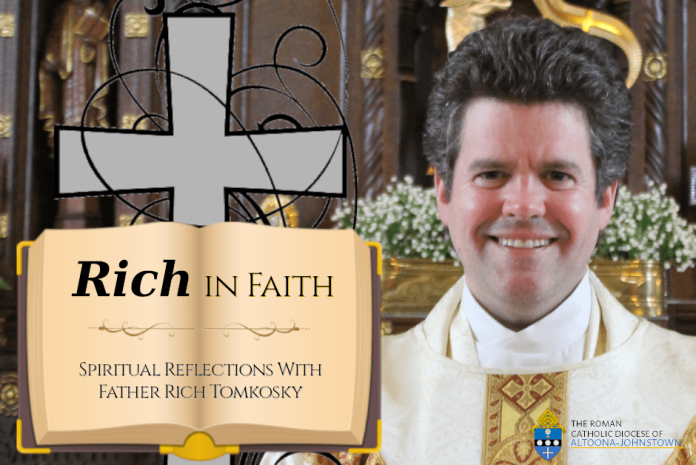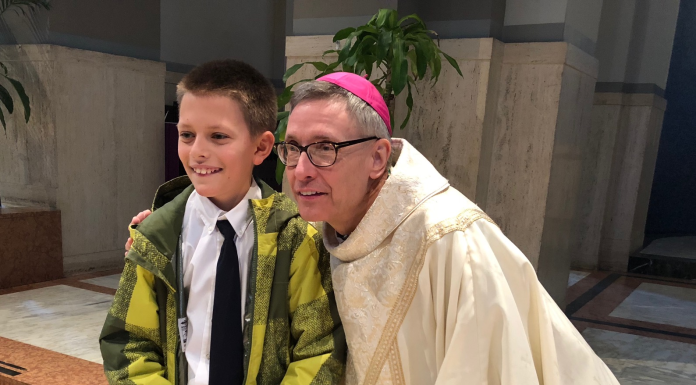By Father Rich Tomkosky
Loving our neighbor means speaking the truth to others, even when it is unpleasant to do so – but hopefully we do it in a humble and attractive way since our God and our faith is based on the truth of what God has revealed for our salvation.
God gives the prophet Ezekiel the mission of speaking the truth of God’s religious and moral standards to the people; and in fact, God tells him that the salvation of his own soul depends on whether he warns the people or not (see my role as a pastor of souls, mothers and fathers and their children, etc.). The results are not what should concern us — that is God’s business (as Saint Mother Teresa once famously said, “God calls us to be faithful – not necessarily successful”). God simply gives us the mission to live and speak the truth of His ways to others. We “speak” to them by all that we say, think, and do.
This is not any easy task by any means, especially in our day. We live in a time of what the recent popes have called an age of moral and spiritual relativism, meaning that many people in our day do not believe in objective standards of religious and moral truth outside of what they decide in their own minds. You often hear statements in our culture which reflect this mentality of relativism: it’s none of my business; that may be true for you, but not for me; we must be “tolerant”; don’t judge, don’t preach, etc.
Because of this deficient mentality, we who are believers are often tempted to give into the moral/spiritual relativism of our time and/or not to speak the truth of God to others, which we have been given in a privileged way through the gift of our Catholic faith, especially when it deals with faith & morals matters (e.g., abortion, sexual morality, euthanasia, getting married in the Church, etc.). But in the end, it will be to our detriment if we don’t speak up now, when we give an account of our life to the Lord after we die. Remember we must speak the truth because peoples’ salvation is at stake! We are called to love the sinner, but hate the sin; not justify the sin because we love the sinner, especially when the issue is difficult, such as drug problems, alcohol problems, someone living the homosexual lifestyle, couples having sexual intimacy without the benefit of the Sacrament of Marriage, married couples not following the Church’s teaching on contraception/sterilization, etc. It is SUCH a temptation to just “go along to get along,” to “keep the peace,” but that is a false charity which never helps anyone in the end. And remember we don’t have to do it in a mean or self-righteous or arrogant way. How we say things is as important as what we say. Pray to the Holy Spirit to witness to the truth in an attractive way, and to know when to speak and when not to speak, and especially to always pray and offer silent sacrifice/penance for the conversion of hearts as Our Lady of Fatima asks us to do on a daily basis. Speak with a gentle firmness, following Jesus’s pattern of fraternal correction in the Gospel. He says, “I do not condemn you, but go and sin no more!” We need both to love our neighbor mercy but also the call to conversion to a holier way of life.
If we truly love someone, we want what is best for them. As Saint Paul puts it so well, “Love does no evil to the neighbor; hence, love is the fulfillment of the law.” A big part of wanting what is best for our neighbor is pointing them to the Lord of life and truth. That is why we are all called to share our faith, to be evangelizers, by virtue of our Baptism. If we truly care about our neighbor, we not only want them to flourish in this life, but also want them to get to Heaven someday. This is shown in the concrete when we are tempted to lead someone into sin, which shows we don’t truly love that other person. To use one example, I remember a powerful talk a priest once gave to teenagers and he pointed out that “if you truly love your boyfriend or girlfriend, you will not pressure them into compromising their morals and being physically intimate with you because that is leading them, as well as yourself, into serious sin, and that is the farthest thing from true love; contrary to what our world tells us.”
There is such a thing as true love and false love. True love wills the ultimate good of the other; false love wills the good of yourself- which is selfishness – the opposite of holiness. Just like there is true and false freedom, as we hear in the opening prayer of Mass. True freedom is making of one’s life a self-gift for the service of God and neighbor, to a cause greater than yourself. A false sense of freedom is being selfish. doing what you want when you want to do it. Sadly, isn’t that the world’s understanding of freedom? Nobody is going to tell me what to do, even God! Frightening! We also are called by God to love our neighbor by praying daily for them, by name and collectively, especially for the people we really don’t like.
Remember in the end we must always speak the truth, with a humble heart, even if others don’t take it well and reject us — a real cross on the human level as we all like to be liked by our fellow human beings, but remember what God thinks of us in the end is what matters. And to confess in the Sacrament of Confession the times we have not spoken the truth when the Lord calls us to do so because of cowardice/human respect. The Gospel is always hard to live, but it is worth the self-sacrifice to do so, as everyone’s salvation is at stake.
And finally remember that I am here to help you in that regard, in any way I can in terms of advice on how to best witness to the Catholic faith to others depending on the circumstances, background, and temperament of the person(s) you are dealing with. God bless you.
Father Rich Tomkosky is the Pastor of Saint Thomas the Apostle Parish in Bedford and the Pastor of Seven Dolors of the Blessed Virgin Mary Parish in Beans Cove.































